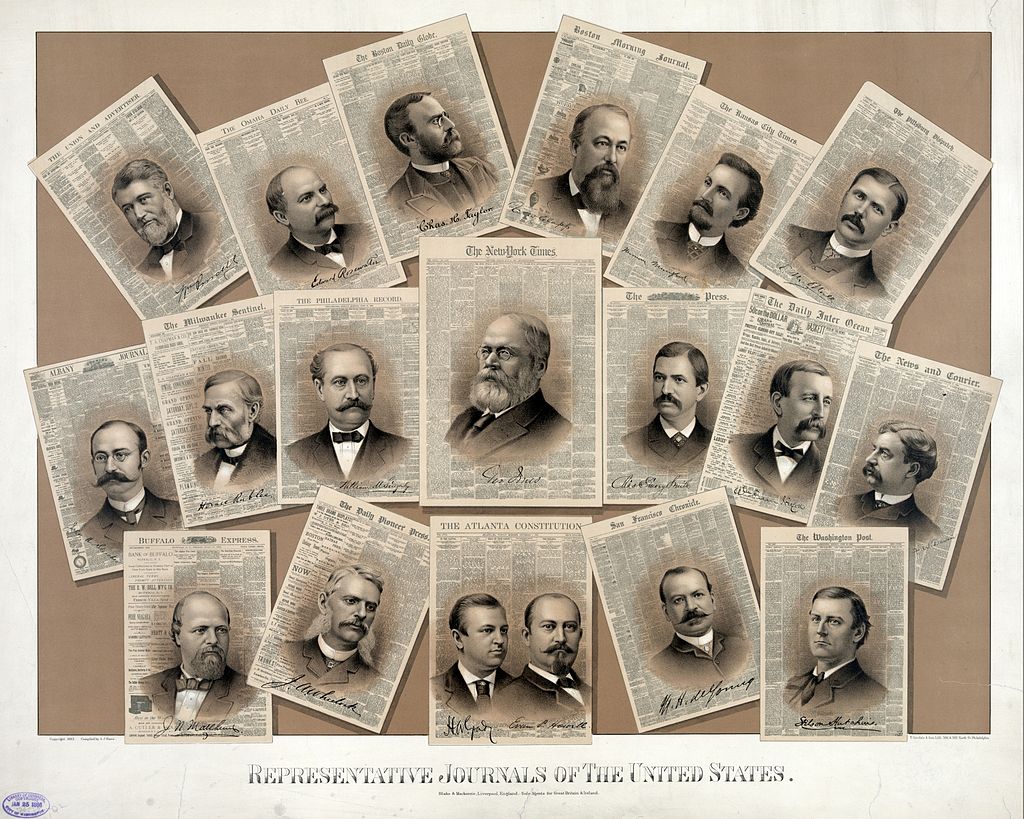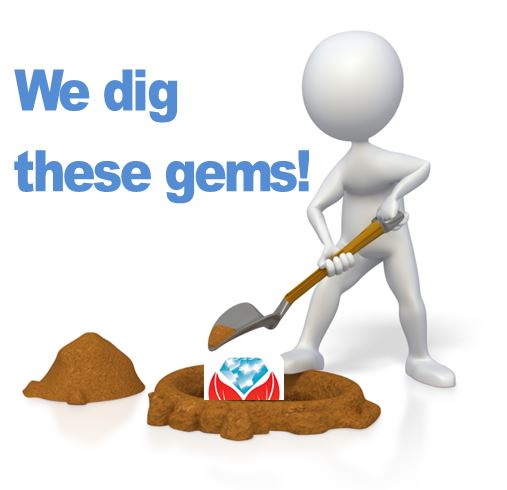Blog


The First Daily Newspaper in the US Wasn’t Exactly Objective

A selection of American newspapers from 1885, with portraits of their publishers. Original image at the Library of Congress, no known restrictions. Digital image from Wikipedia (click to view).
The first daily newspaper in the US, The Pennsylvania Evening Post, appeared in Philadelphia on this day in 1783. It was short-lived as a daily, but gained traction as a semi-regular paper by 1775. How did publisher Benjamin Towne make it work? By not having a lick of journalistic objectivity, apparently.
“Towne was able to survive through the War for Independence by supporting the side in power,” says this post at FamousDaily.com. “In 1775 his Evening Post was vocal in opposition to the British; but when Philadelphia was occupied briefly by the British troops, Towne welcomed them with open arms. Then when the Patriots took back the city, Towne published a special ‘patriotic’ edition of his paper in honor of their return.”
What a great story! His success heralded more to come. According to a post at the U.S. Census website, “Americans’ hunger for news was such that by 1850, there were some 250 dailies. The number of newspapers peaked around a hundred years ago, when there were 2,600 dailies published across the nation, with a circulation of over 24 million.”
Newspapers are one of the best places to learn more about our ancestors’ everyday lives, their vital events and happenings that affected them. Learn more in Lisa Louise Cooke’s book How to Find Your Family History in Newspapers. Here you’ll find inspiring stories about what’s IN newspapers, step-by-step instructions, worksheets and checklists, tons of free and worth-a-few bucks online resources, and a massive amount of location-specific websites for international and U.S. historical newspapers.
 Would you rather learn by watching? Genealogy Gems Premium members and subscribing genealogy societies can enjoy Lisa’s two-part video series, “Getting the Scoop on Your Ancestors in Newspapers.” You’ll learn what key family history information may be found in historical newspapers; how to identify newspapers that likely covered your ancestors; websites that have digitized collections of newspapers; Lisa’s top search tips and cool tech tools; how to use Evernote in your newspaper research; and more about African-American Newspaper Research (bonus download!).
Would you rather learn by watching? Genealogy Gems Premium members and subscribing genealogy societies can enjoy Lisa’s two-part video series, “Getting the Scoop on Your Ancestors in Newspapers.” You’ll learn what key family history information may be found in historical newspapers; how to identify newspapers that likely covered your ancestors; websites that have digitized collections of newspapers; Lisa’s top search tips and cool tech tools; how to use Evernote in your newspaper research; and more about African-American Newspaper Research (bonus download!). 
Click here to learn more about Genealogy Gems Premium membership, and (NEW!) click here to see how your genealogy society can watch these and other Premium videos at their meetings!

We Dig These Gems: New Genealogy Records Online
Every Friday, we blog about new genealogy records online. Might these collections include your ancestors? And does the Google search tip we’ve added at the bottom help you out?
This week: Kansas newspapers, WWI records for the U.S. and Canada and a unique collection of mid-1800s Shaker photographs.
KANSAS NEWSPAPERS. Subscribers to Newspapers.com can search a newly enlarged database of Kansas newspapers. It “currently has more than 190 papers from almost 90 Kansas cities for a total of 4.3 million pages.” One paper dates to 1840, 20 years before statehood.
SHAKER PHOTOGRAPHS. The Shaker Museum Mount Lebanon (New York) “has launched a newly digitized online catalog of historic photography as a part of its ongoing effort to make available online a full catalog of its collections,” says this press report. Photos include “scenes of Shaker villages from the mid-late 19th Century, as well as a collection of stereograph images from this early period.”
CANADA WWI MILITARY RECORDS. Ancestry recently posted a new collection of “more than 17,000 historical military records (featuring more than 470,000 images) revealing the First World War military experiences of many Canadian soldiers. The Canada, Imperial War Service Gratuities, 1919-1921 collection contains records of Canadians who fought and served in the British Imperial services.” Note: the above link goes to Ancestry.com but the database is also available on Ancestry.ca.
U.S. WWI PHOTOGRAPHS. The National Archives (U.S.) has a newly digitized collection online: American Unofficial Collection of World War I Photographs, 1917-1918. According to the site, “This series contains photographs obtained from the U.S. Army Signal Corps, Federal and State government agencies, as well as private sources, such as the American Red Cross and the Central News and Photo Service. The photos depict the unity of the nation and how overwhelming the war effort was, including pictures of public gatherings, peace demonstrations, parades, and activities of libraries, hospitals and first aid stations.”
Google tip of the week: Some databases are hosted on multiple genealogy websites. For example, The New England Historical and Genealogical Society has been receiving a lot of new databases from FamilySearch. Ancestry has recently posted several databases from JewishGen, which also hosts them on their site. One site may have the search tools you prefer; another may be more convenient because you can attach records to your tree on that site. Use Google’s site search tool to see if the database is on a particular site. Enter the keywords in quotes, then the word “site:” immediately followed by the URL without the www. (There is no space between site: and the website address.) A search for the Canadian database above in Ancestry.ca looks like this: “Imperial War Service Gratuities” site:Ancestry.ca. This tip is brought to you by the newly-revised 2nd edition of The Genealogist’s Google Toolbox by Lisa Louise Cooke, which has an entire chapter on site searching and resurrecting old websites.

Look for Genealogy Records in a State Capital
 Recently we heard from Jennifer, who wondered what kinds of genealogy resources she might discover in a state capital.
Recently we heard from Jennifer, who wondered what kinds of genealogy resources she might discover in a state capital.
“I’m tagging along on my husband’s thesis research trip to Columbus, Ohio. I have some ancestors from other parts of Ohio. I was wondering what exactly I could look for in a state’s capital collections/archives that could save me a trip to the city or county? I was thinking that the state capital may have a “gem” that I couldn’t find elsewhere, or even duplicated information [from local repositories]. Do you know?”
Yes, Jennifer is definitely thinking along the right lines! Here’s our advice:
At the state level there are often two key resources: the state library and the state archives. These might be combined. One might be called the state historical society. You just have to look for each state. In Ohio, the Ohio History Connection serves as the state historical society and official state archives. But there is also a state library that serves as a repository for government documents and a resource for other libraries. Each has resources for genealogists, online and in-house. (Click here for digital genealogy content at the state library and here for resources at the Archives/Library of the Ohio History Connection).
In addition, public libraries of major cities often have excellent local history and genealogy collections. This is definitely true of the Columbus Metropolitan Library in Ohio’s state capital!
We suggest you contact librarians before you go and ask what they have that can’t be found anywhere else, both on a state level and for locales you are researching. Often times that will include photograph collections, company (business) collections, and my favorite newspapers on microfilm. If you can formulate specific genealogical questions that you want to try and answer and share those ahead of time with the librarian that will help her guide you toward the unique gems. Every state library and archive is unique, so consulting by phone with the reference librarian is the best way to go.
 Here are a few articles on my website that can help you prepare to find genealogy records in a state capital repository or in any major library:
Here are a few articles on my website that can help you prepare to find genealogy records in a state capital repository or in any major library:







